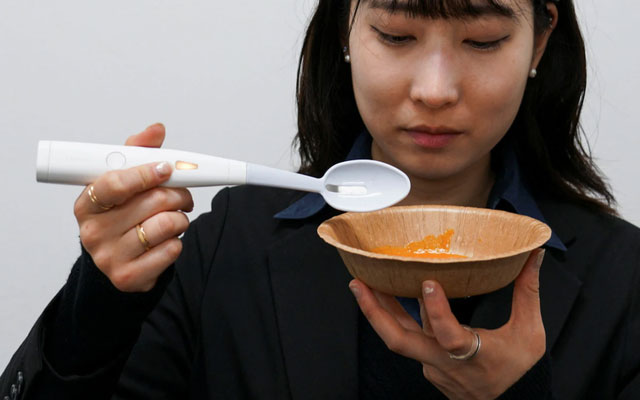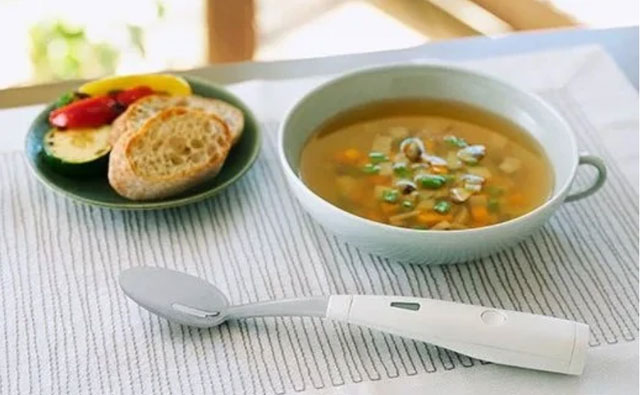The 'tycoon' of the Japanese beer industry launches an electronic spoon to prevent strokes
The electronic spoon transmits a weak electric field from the spoon to concentrate sodium ion molecules on the tongue to enhance the perception of the salty taste of food without adding salt.
Japanese beverage giant Kinder Holding will sell an electronic spoon that researchers claim can promote healthier eating by increasing saltiness without adding salt.
The first product launch on May 20 marked the first commercialization of technology for a product that last year received the Ig Nobel Prize, an award honoring unusual research.

Kinder Holding launches an electronic spoon that can create a salty taste without adding salt to food.
Kirin will only sell 200 electric salt spoons online for 127 USD (3.2 million VND) this month and in limited quantities at a Japanese retailer in June.
However, Kirin hopes to have 1 million users globally within 5 years. Overseas sales will begin next year.
It is known that Kirin's spoon made of plastic and metal was co-developed by Meiji University professor Homei Miyashita, who once demonstrated the taste-enhancing effect in a prototype of electric chopsticks.
This effect works by transmitting a weak electric field from the spoon to concentrate sodium ion molecules on the tongue to enhance the perception of the salty taste of food. Weighing 60g, the spoon runs on a rechargeable lithium battery.

The spoon can be charged when the battery runs out.
A Kirin representative said that this technology has special significance in Japan, where the average adult consumes about 10 grams of salt per day, double the amount recommended by the World Health Organization (WHO). .
Excess salt intake can lead to increased rates of high blood pressure, stroke and other diseases.
"Japan has a culinary culture that favors salty flavors ," said Ai Sato, a Kirk researcher.
"Japanese people in general need to reduce their salt intake, but it is difficult to give up what we are used to eating. That's why we developed this electric spoon."

Reducing daily salt intake will help effectively prevent stroke and high blood pressure
Eating excess salt is the main risk factor for high blood pressure, leading to stroke, myocardial infarction and many other cardiovascular diseases. Eating too much salt increases the risk of stomach cancer, kidney failure, osteoporosis and other health disorders.
The World Health Organization recommends that each adult should consume less than 5 grams of salt/day (equivalent to 1 teaspoon). However, most people consume twice as much salt as recommended, which is about 10 grams/day.
5 grams of salt is equivalent to:
- 1 teaspoon full of salt
- 8 grams of soup powder (equal to 1.5 full teaspoons)
- 11 grams of seasoning powder (equal to 2 full teaspoons)
- 25 grams of fish sauce (equal to 2.5 spoons of rice)
- 35 grams of soy sauce (equal to 3.5 tablespoons of rice)
- Amount of salty spices in 1 package of instant noodles
Horrible whole pig specialty that hangs from the ceiling for 30 years and smells bad
How amber creates exquisite fossils that preserve Earth's history
This plant is a "golden medicinal herb" that helps control blood sugar and lower blood pressure effectively
- Electronic spatulas can measure the salt content of foods
- 10 great reasons to drink beer
- The unexplored truth about beer
- Beer and 24 mysteries that you can't expect
- Why is beer harder to overflow than coffee?
- 9 interesting things about beer
- There is going to be brewed dry beer like coffee
- Learn the history of beer
- The bitter taste of beer can prevent cancer
- Heineken launches beer ... no alcohol
- Can beer be seduced by drinkers?
- What makes the world's top beer?
 The US company is about to build a supersonic passenger plane of 6,000km / h
The US company is about to build a supersonic passenger plane of 6,000km / h Japan develops avatar robot as in fiction film
Japan develops avatar robot as in fiction film Australia tested the world's first mango picking robot
Australia tested the world's first mango picking robot America develops technology to separate water from animal waste
America develops technology to separate water from animal waste